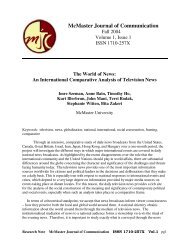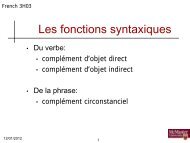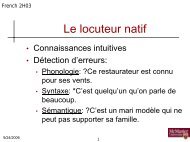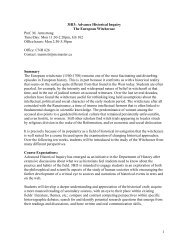The Syntax of Givenness Ivona Kucerová
The Syntax of Givenness Ivona Kucerová
The Syntax of Givenness Ivona Kucerová
Create successful ePaper yourself
Turn your PDF publications into a flip-book with our unique Google optimized e-Paper software.
‘Martin was loved again.’<br />
<strong>The</strong> cut in Czech is identical to the morphologically marked difference between perfective<br />
and imperfective verbs. 5 Thus, while imperfective verbs do obligatory give rise to<br />
a presupposition containing the subject, perfective verbs are compatible with subject-less<br />
presuppositions. Since most Czech verbs have both imperfective and perfective stems we<br />
can test the difference on minimal pairs.<br />
(34) Imperfective version <strong>of</strong> kick:<br />
a. Marie was kicking Petr for half an hour and then she stopped. Petr got relieved<br />
but then. . .<br />
b. #Jana zase kopala Petra.<br />
Jana.Nom again kicked.Impf Petr.Acc<br />
‘Jana kicked Petr again.’<br />
c. Petr byl zase kopán.<br />
Petr.Nom was again kicked<br />
‘Petr was kicked again.’ 6<br />
(35) Perfective version <strong>of</strong> kick:<br />
a. Marie kicked Petr once and then she left. Petr got relieved but then. . .<br />
b. Jana zase kopla Petra.<br />
Jana.Nom again kicked.Perf Petr.Acc<br />
‘Jana kicked Petr again.’<br />
We can see the morphological difference more clearly in the future tense because imperfective<br />
verbs form the analytical future in contrast to perfective verbs which form the<br />
synthetic future.<br />
(36) Imperfective version <strong>of</strong> kick – future:<br />
a. Marie was kicking Petr for half an hour and then she stopped. Petr got relieved<br />
because he didn’t know that. . .<br />
b. #Jana bude zase kopat Petra.<br />
Jana.Nom will again kick.Impf Petr.Acc<br />
‘Jana would kick Petr again.’<br />
(37) Perfective version <strong>of</strong> kick – future:<br />
a. Marie kicked Petr once and then she left. Petr got relieved because he didn’t<br />
know that. . .<br />
b. Jana zase kopne Petra.<br />
Jana.Nom again will-kick.Perf Petr.Acc<br />
5 I believe that Bale’s conclusion that the relevant partition <strong>of</strong> verbs with respect to their propositional<br />
properties is not correct. I think that even in English, the relevant difference is between perfective and<br />
imperfective verbs. <strong>The</strong> difference is, however, not so easily detectable because English does not have any<br />
overt morphological marking that would give a clear cut for Bale’s cases. Bale lists several counterexamples<br />
to his proposal. <strong>The</strong>y all fall under the perfective/imperfective distinction.<br />
6 In fact, the passive form is slightly awkward but this is for independent reason: there is a lexical ambiguity<br />
involving (‘kick’ and ‘dig’) because <strong>of</strong> which a native speaker prefers an impersonal passive to a regular<br />
passive.<br />
97

















